牛津深圳版七年级下 3.1 Unit 3 Reading(课件)+嵌入音频
文档属性
| 名称 | 牛津深圳版七年级下 3.1 Unit 3 Reading(课件)+嵌入音频 |  | |
| 格式 | pptx | ||
| 文件大小 | 13.4MB | ||
| 资源类型 | 试卷 | ||
| 版本资源 | 牛津深圳版 | ||
| 科目 | 英语 | ||
| 更新时间 | 2023-02-28 14:31:44 | ||
图片预览

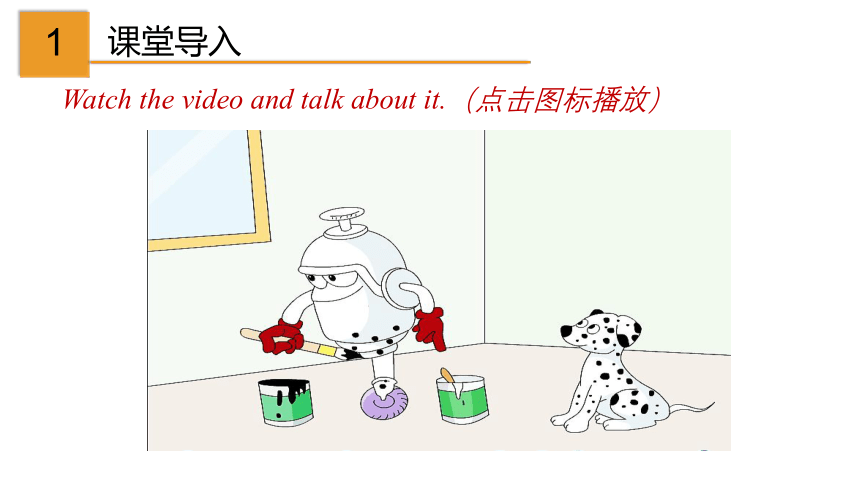
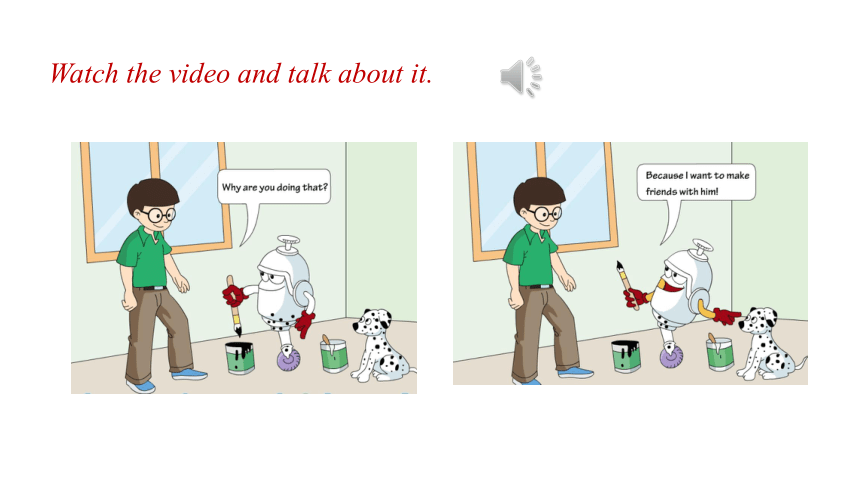

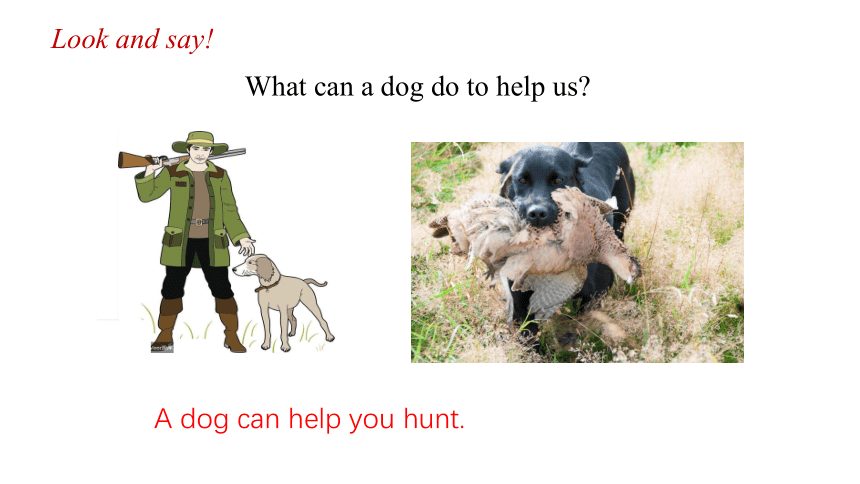
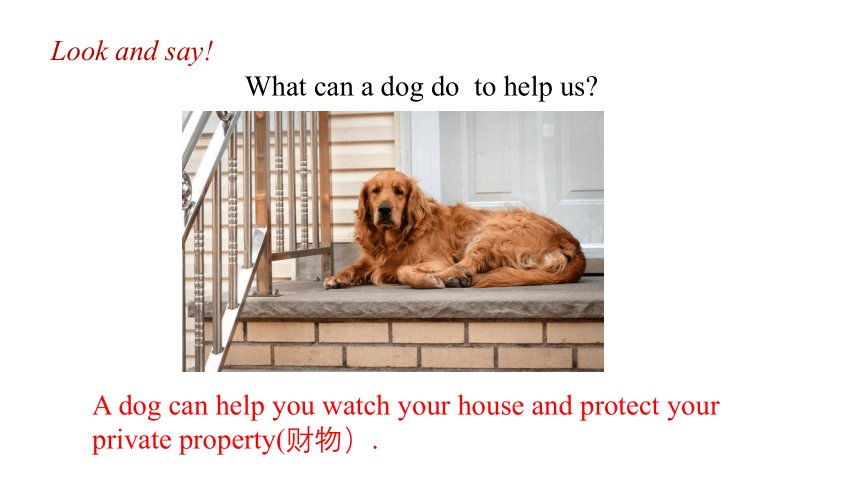

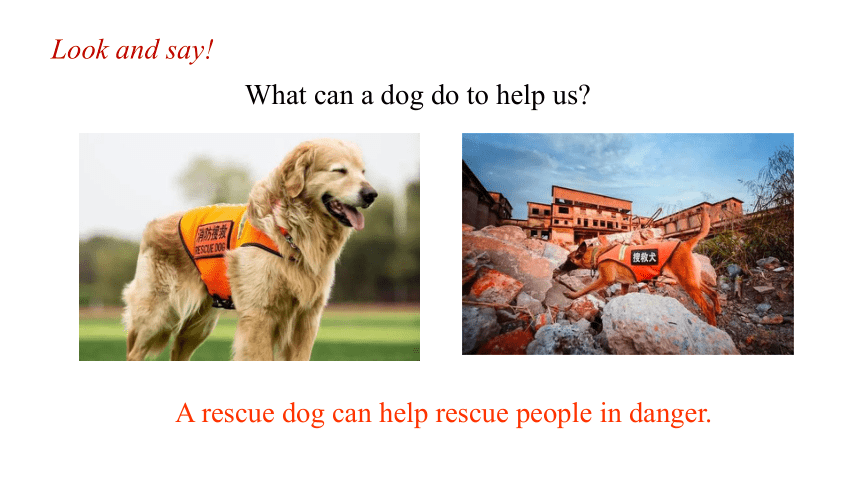
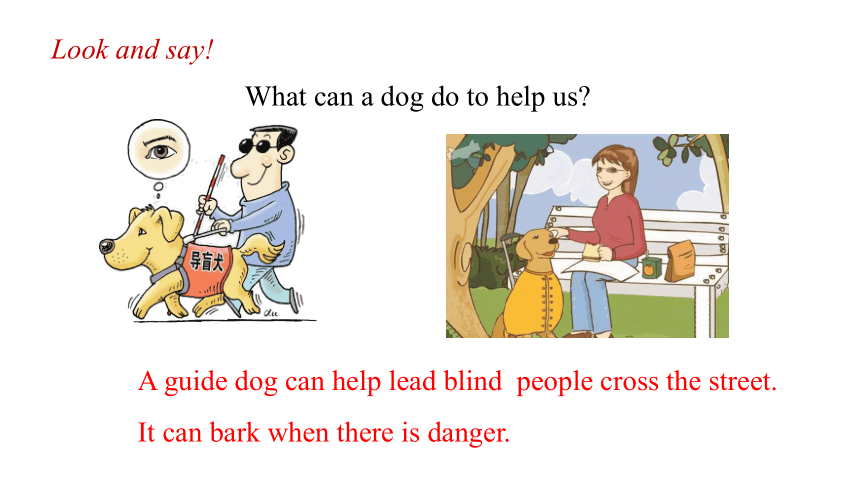
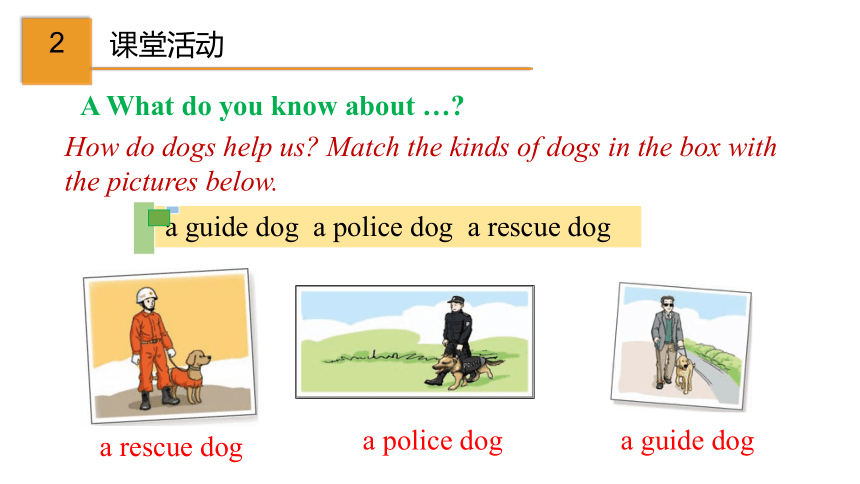
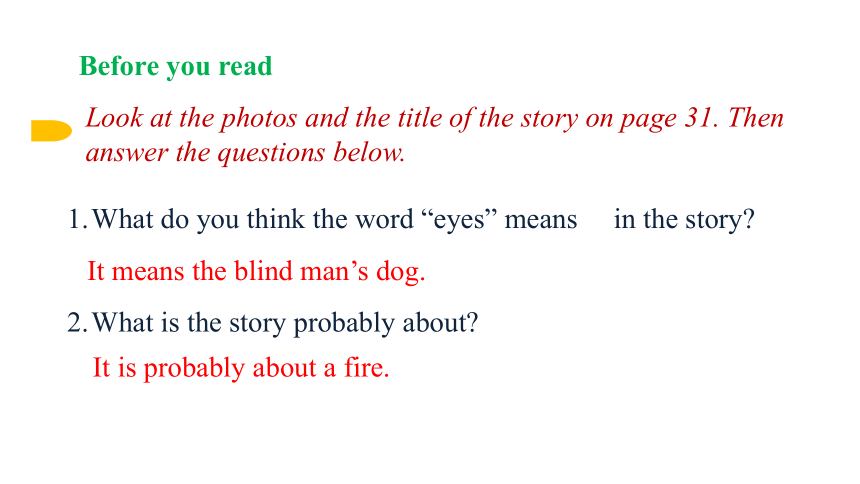
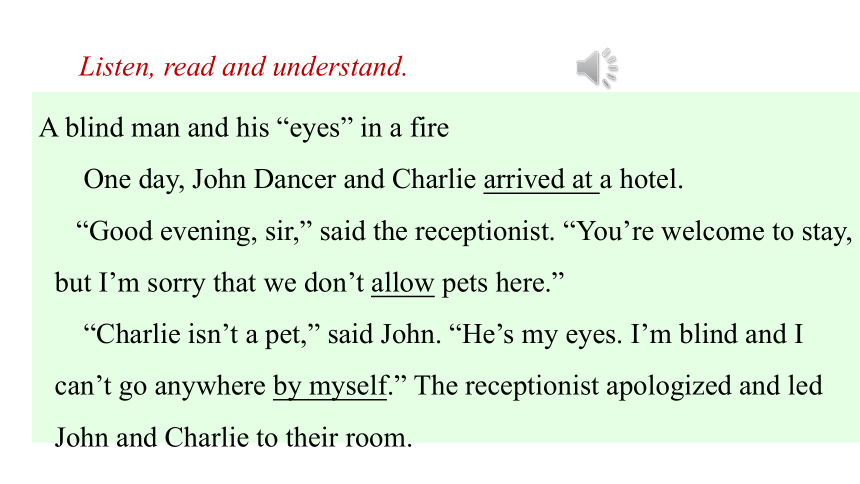
文档简介
(共39张PPT)
Unit 3 Our animal friends
Reading
牛津深圳版七年级下册
Watch the video and talk about it.(点击图标播放)
1
课堂导入
Watch the video and talk about it.
Animals are man’s good friends.
They are very helpful to us.
Look and say!
What can a dog do to help us
A dog can help you hunt.
Look and say!
A dog can help you watch your house and protect your private property(财物).
What can a dog do to help us
A police dog can help the police catch bad people.
Look and say!
What can a dog do to help us
A rescue dog can help rescue people in danger.
Look and say!
What can a dog do to help us
A guide dog can help lead blind people cross the street.
It can bark when there is danger.
Look and say!
What can a dog do to help us
a rescue dog
a police dog
a guide dog
How do dogs help us Match the kinds of dogs in the box with the pictures below.
A What do you know about …
2
课堂活动
a guide dog a police dog a rescue dog
Look at the photos and the title of the story on page 31. Then answer the questions below.
What do you think the word “eyes” means in the story
What is the story probably about
It means the blind man’s dog.
It is probably about a fire.
Before you read
A blind man and his “eyes” in a fire
One day, John Dancer and Charlie arrived at a hotel.
“Good evening, sir,” said the receptionist. “You’re welcome to stay, but I’m sorry that we don’t allow pets here.”
“Charlie isn’t a pet,” said John. “He’s my eyes. I’m blind and I can’t go anywhere by myself.” The receptionist apologized and led John and Charlie to their room.
Listen, read and understand.
John was very tired. He soon fell asleep.
Some time later, Charlie started barking.
John woke up and smelt smoke. A fire!
Smoke started to come in from under the door. With Charlie’s help, John put some wet towels along the bottom of the door. Then he got down on the floor next to Charlie and waited.
Soon he heard the sound of a fire engine. A fireman arrived and got him out of the building, but the fireman did not want to take Charlie. John would not go without his “eyes”. Finally, the fireman got Charlie out of the building too and they were both safe.
Listen, read and understand.
Para1
John and Charlie arrived at a hotel
Para2
Charlie doesn’t allowed by the hotel.
Para3
The receptionist apologized to John.
Para4
John and Charlie suffered the fire.
Para5
John and Charlie were both safe .
1.John and Charlie arrived at the hotel in the afternoon. _____
2.Charlie was very tired and fell asleep very soon. _____
3.John and Charlie got down on the floor and waited for help. _____
4.John and Charlie got down on the floor and waited for help. _____
5.The fireman saved both John and Charlie. _____
F
T
F
F
T
Read and find True or False questions.
1 A blind person is____.
a not able to see b not able to hear
2 If I do something by myself, I do it ____.
a without help b with help
3 When you apologize to someone, you say “___” to him or her.
a Thank you b Sorry
The words in italics are from the story on page 31. Circle the correct answers to complete these sentences.
C1
4 If a person leads you to a place, he or she ___ you there.
a takes b keeps
5 If someone wakes up, he or she ____.
a starts sleeping b stops sleeping
allowed apologized woke up anywhere fell asleep
Completer the passage with the words in box.
It was a nice day today, so I took my pet dog, Flash, to the park. It was hot, I ____________ under a tree.
When I _______, I couldn’t see Flash _________! I looked around the park and then I saw him; he was barking loudly at an old man! I stopped him.
The park keeper came over and said, “You’d better look after him or you won’t be _______ in the park again!”
I ________ to the old man and the park keeper and took Flash home.
fell asleep
woke up anywhere
allowed
apologized
C2
D. Comprehension
2
1
3
4
5
6
The following pictures show the story on page 31. Read the story. Then put the pictures in the correct order and write the numbers 1-6 in the boxes.
D1
Try to describe every picture.
The receptionist didn't allow
Charlie to stay in the hotel.
The receptionist apologized
and let Charlie to the room.
Try to describe every picture.
Some time later,
Charlie started barking.
Then he got down on the floor
next to Charlie and waited.
Try to describe every picture.
A fireman arrived and got him out of the building, but the fireman did not want to take Charlie.
Finally, the firemen got Charlie
out of the building too and they
were both safe.
Did John save Charlie or did Charlie save John Discuss this with your classmates.
Possible answers
Charlie saved John.---- Charlie baked to wake John up when the fire started. Charlie helped John put some wet towels along the bottom of the door.
John saved Charlie.---- The fireman did not want to take Charlie. John would not go without Charlie. Finally, the firemen got Charlie out of the building too and they were both safe.
D2
1. arrive at 到达
1)arrive 是不及物动词,不能直接接地点名词作宾语,要用“arrive at / in +地点”表示到达某地;
一般来说,arrive at 后面接小地方,如学校、饭堂、图书馆等;
arrive in 后面接大地方,如城市、国家等。例如:
My father arrives at his office at eight o’clock every morning.
我爸爸每天早上八点钟到办公室。
Language points
2)reach作及物动词时,意为“到达”,后面直接接地点名词。
例如:今天早上你几点到达学校?
What time did you reach school this morning
3)get to 后面可接地点名词。
例如:我明天早上十点钟到图书馆。
I will get to the library at 10 a.m. tomorrow.
注意:后面接here、there、home 等副词时,arrive at / in和get to都要省略介词。
例如:我妈妈下班后通常六点钟到家。
My mother usually arrive/gets home at 6 p.m. after work.
选用reach, arrive (at / in)或get (to)填空,并注意其形式。
(1) He’ll call me as soon as he __________________there.
(2) It was late at night when my father ______.
(3) When I ______________________ the station, the train was about to leave the station.
reaches / arrives / gets
arrived
reached / arrived at / got to
2. I can’t go anywhere by myself.
我不能独自去任何地方。
① anywhere adv. 任何地方
随便坐吧!Sit anywhere you like!
当用于否定句,疑问句或条件句中,意为“什么地方”。
上周六你去了什么地方了吗?Did you go anywhere last Saturday
② by oneself 意为“独自”,用于句尾,相当于alone,两者可以互换使用。
我们应该独自完成家庭作业。
We should do our homework by ourselves.
= We should do our homework alone.
注意oneself 的变化要与主语的人称一致。
3. The receptionist apologized and led John and Charlie to their room.
接待员道了歉,然后把约翰和查理带去他们的房间。
①apologize v. 道歉
apologize to sb. for sth. 因为…向某人道歉
他因迟到向我们道歉。
He apologized to us for coming late.
②lead v. (过去式led) 带领
led (sb.) to 带着(某人)到……
接待员带我们来到会议室。
The receptionist led us to the meeting room.
4. Some time later, Charlie started barking.
一段时间之后,查利开始吠叫起来。
① some time意为“一段时间;一些时间”。
【辨析】
词汇 用法
some time 名词词组,意为“一段/些间”。
sometime 副词,意为“(过去或将来的)某个时候”。
some times 名词词组,意为“几次;几倍”。
sometimes 副词,意为“有时”。
如:
我们打算在海南待一段时间。 We plan to stay in Hainan for some time.
汤姆将会找个时间去探望他的叔叔。Tom will visit his uncle sometime.
你的房间比我的大几倍。 Your room is some times bigger than mine.
我有时会在这家餐馆吃晚饭。I sometimes have supper in this restaurant.
选用some time,sometime,some times 或sometimes填空。
1. He __________ plays basketball with his friends after school.
2. We can talk about it now. We still have __________.
3. You will understand your mother _________in the future.
4. He has been to Beijing ___________ before.
sometimes
some time
sometime
some times
②later 在本句中作副词,意为“后来;之后”。表示“……之后”的词还有in和after。【辨析】
一般用法 句子时态
时间段+ later 一般将来时或一般过去时
in +时间段 一般将来时
after +时间段或时间点 一般将来时或一般过去时
如:两天后,他将要去上海。
He will go to Shanghai two days later.= He will go to Shanghai in two days.
两天后,他去了上海。
Two days later, he went to Shanghai.= After two days, he went to Shanghai.
两点钟之后,他将要去上海。
He will go to Shanghai after two o’clock.
5. With Charlie’s help, John put some wet towels along the bottom of the door.
在查理的帮助下,约翰沿着门底放了一些湿毛巾。
with sb's help =with the help of sb意为“在某
人的帮助下”,常置于句首。
With my teacher's help, I did better in my studies.
= With the help of my teacher, I did better in my studies.
在我的老师的帮助下,我的学习更好了。
6. You’d better look after him or you won’t be allowed in the park again!
你最好看管好他,否则你将不再获准进入这个公园!
① 肯定形式:you’d better do sth. = you had better do sth. 你最好做某事
否定形式:you’d better not do sth.=you had
better not do sth 你最好不要做某事
你最好不要玩火。You’d better not play with fire.
②or 在本句中意为“否则;不然”,引导结果状语从句,表示如果主句中阐述的事情做不到,就会导致从句中阐述的后果。如:
Hurry up! Or you’ll be late for school.
快点!否则你上学就迟到了。
3
课堂小结
1.We have read an article about a blind man and his guide dog.
2. We have grasped the new words and expressions in the reading.
一、根据下列句子及所给单词的首字母写出 所缺单词,注意其形式。
1. I had no TVs or computers when I was a child. I often listened to the r______ at that time.
2. My mother doesn't a______ my father to smoke at home, so my father has to smoke outside.
adio
llow
3. Yesterday afternoon I helped a b______ old man cross the street and my mother said I was a good boy.
4. What do you think the word "UFO" m______ ?
5. Many children like to keep little rabbits as p______.
ets
lind
ean
4
课堂训练
二、根据中文意思完成句子。
1. 昨晚我们11点半到达北京机场。
We ______ ____ the Beijing Airport at 11:30 last night.
2. 我昨天晚上独自完成作业.
I __________ my homework ____ _______ last night.
3. 妈妈经常带我去白云山。
Mother often ____ ____ ____ the Baiyun Mountain.
arrived at
did / finished by myself
leads me to
4. 我太累了,以致在开车去上班的途中差点 睡着了。
I was so tired that I almost ____ ______ when I drove to work.
5. 在圣诞节那天,当她醒来时发现床上有个玩具熊。
She ______ a toy bear on her bed when she ____ ____ on Christmas Day.
found woke up
fell asleep
谢谢
21世纪教育网(www.21cnjy.com)
中小学教育资源网站
兼职招聘:
https://www.21cnjy.com/recruitment/home/admin
Unit 3 Our animal friends
Reading
牛津深圳版七年级下册
Watch the video and talk about it.(点击图标播放)
1
课堂导入
Watch the video and talk about it.
Animals are man’s good friends.
They are very helpful to us.
Look and say!
What can a dog do to help us
A dog can help you hunt.
Look and say!
A dog can help you watch your house and protect your private property(财物).
What can a dog do to help us
A police dog can help the police catch bad people.
Look and say!
What can a dog do to help us
A rescue dog can help rescue people in danger.
Look and say!
What can a dog do to help us
A guide dog can help lead blind people cross the street.
It can bark when there is danger.
Look and say!
What can a dog do to help us
a rescue dog
a police dog
a guide dog
How do dogs help us Match the kinds of dogs in the box with the pictures below.
A What do you know about …
2
课堂活动
a guide dog a police dog a rescue dog
Look at the photos and the title of the story on page 31. Then answer the questions below.
What do you think the word “eyes” means in the story
What is the story probably about
It means the blind man’s dog.
It is probably about a fire.
Before you read
A blind man and his “eyes” in a fire
One day, John Dancer and Charlie arrived at a hotel.
“Good evening, sir,” said the receptionist. “You’re welcome to stay, but I’m sorry that we don’t allow pets here.”
“Charlie isn’t a pet,” said John. “He’s my eyes. I’m blind and I can’t go anywhere by myself.” The receptionist apologized and led John and Charlie to their room.
Listen, read and understand.
John was very tired. He soon fell asleep.
Some time later, Charlie started barking.
John woke up and smelt smoke. A fire!
Smoke started to come in from under the door. With Charlie’s help, John put some wet towels along the bottom of the door. Then he got down on the floor next to Charlie and waited.
Soon he heard the sound of a fire engine. A fireman arrived and got him out of the building, but the fireman did not want to take Charlie. John would not go without his “eyes”. Finally, the fireman got Charlie out of the building too and they were both safe.
Listen, read and understand.
Para1
John and Charlie arrived at a hotel
Para2
Charlie doesn’t allowed by the hotel.
Para3
The receptionist apologized to John.
Para4
John and Charlie suffered the fire.
Para5
John and Charlie were both safe .
1.John and Charlie arrived at the hotel in the afternoon. _____
2.Charlie was very tired and fell asleep very soon. _____
3.John and Charlie got down on the floor and waited for help. _____
4.John and Charlie got down on the floor and waited for help. _____
5.The fireman saved both John and Charlie. _____
F
T
F
F
T
Read and find True or False questions.
1 A blind person is____.
a not able to see b not able to hear
2 If I do something by myself, I do it ____.
a without help b with help
3 When you apologize to someone, you say “___” to him or her.
a Thank you b Sorry
The words in italics are from the story on page 31. Circle the correct answers to complete these sentences.
C1
4 If a person leads you to a place, he or she ___ you there.
a takes b keeps
5 If someone wakes up, he or she ____.
a starts sleeping b stops sleeping
allowed apologized woke up anywhere fell asleep
Completer the passage with the words in box.
It was a nice day today, so I took my pet dog, Flash, to the park. It was hot, I ____________ under a tree.
When I _______, I couldn’t see Flash _________! I looked around the park and then I saw him; he was barking loudly at an old man! I stopped him.
The park keeper came over and said, “You’d better look after him or you won’t be _______ in the park again!”
I ________ to the old man and the park keeper and took Flash home.
fell asleep
woke up anywhere
allowed
apologized
C2
D. Comprehension
2
1
3
4
5
6
The following pictures show the story on page 31. Read the story. Then put the pictures in the correct order and write the numbers 1-6 in the boxes.
D1
Try to describe every picture.
The receptionist didn't allow
Charlie to stay in the hotel.
The receptionist apologized
and let Charlie to the room.
Try to describe every picture.
Some time later,
Charlie started barking.
Then he got down on the floor
next to Charlie and waited.
Try to describe every picture.
A fireman arrived and got him out of the building, but the fireman did not want to take Charlie.
Finally, the firemen got Charlie
out of the building too and they
were both safe.
Did John save Charlie or did Charlie save John Discuss this with your classmates.
Possible answers
Charlie saved John.---- Charlie baked to wake John up when the fire started. Charlie helped John put some wet towels along the bottom of the door.
John saved Charlie.---- The fireman did not want to take Charlie. John would not go without Charlie. Finally, the firemen got Charlie out of the building too and they were both safe.
D2
1. arrive at 到达
1)arrive 是不及物动词,不能直接接地点名词作宾语,要用“arrive at / in +地点”表示到达某地;
一般来说,arrive at 后面接小地方,如学校、饭堂、图书馆等;
arrive in 后面接大地方,如城市、国家等。例如:
My father arrives at his office at eight o’clock every morning.
我爸爸每天早上八点钟到办公室。
Language points
2)reach作及物动词时,意为“到达”,后面直接接地点名词。
例如:今天早上你几点到达学校?
What time did you reach school this morning
3)get to 后面可接地点名词。
例如:我明天早上十点钟到图书馆。
I will get to the library at 10 a.m. tomorrow.
注意:后面接here、there、home 等副词时,arrive at / in和get to都要省略介词。
例如:我妈妈下班后通常六点钟到家。
My mother usually arrive/gets home at 6 p.m. after work.
选用reach, arrive (at / in)或get (to)填空,并注意其形式。
(1) He’ll call me as soon as he __________________there.
(2) It was late at night when my father ______.
(3) When I ______________________ the station, the train was about to leave the station.
reaches / arrives / gets
arrived
reached / arrived at / got to
2. I can’t go anywhere by myself.
我不能独自去任何地方。
① anywhere adv. 任何地方
随便坐吧!Sit anywhere you like!
当用于否定句,疑问句或条件句中,意为“什么地方”。
上周六你去了什么地方了吗?Did you go anywhere last Saturday
② by oneself 意为“独自”,用于句尾,相当于alone,两者可以互换使用。
我们应该独自完成家庭作业。
We should do our homework by ourselves.
= We should do our homework alone.
注意oneself 的变化要与主语的人称一致。
3. The receptionist apologized and led John and Charlie to their room.
接待员道了歉,然后把约翰和查理带去他们的房间。
①apologize v. 道歉
apologize to sb. for sth. 因为…向某人道歉
他因迟到向我们道歉。
He apologized to us for coming late.
②lead v. (过去式led) 带领
led (sb.) to 带着(某人)到……
接待员带我们来到会议室。
The receptionist led us to the meeting room.
4. Some time later, Charlie started barking.
一段时间之后,查利开始吠叫起来。
① some time意为“一段时间;一些时间”。
【辨析】
词汇 用法
some time 名词词组,意为“一段/些间”。
sometime 副词,意为“(过去或将来的)某个时候”。
some times 名词词组,意为“几次;几倍”。
sometimes 副词,意为“有时”。
如:
我们打算在海南待一段时间。 We plan to stay in Hainan for some time.
汤姆将会找个时间去探望他的叔叔。Tom will visit his uncle sometime.
你的房间比我的大几倍。 Your room is some times bigger than mine.
我有时会在这家餐馆吃晚饭。I sometimes have supper in this restaurant.
选用some time,sometime,some times 或sometimes填空。
1. He __________ plays basketball with his friends after school.
2. We can talk about it now. We still have __________.
3. You will understand your mother _________in the future.
4. He has been to Beijing ___________ before.
sometimes
some time
sometime
some times
②later 在本句中作副词,意为“后来;之后”。表示“……之后”的词还有in和after。【辨析】
一般用法 句子时态
时间段+ later 一般将来时或一般过去时
in +时间段 一般将来时
after +时间段或时间点 一般将来时或一般过去时
如:两天后,他将要去上海。
He will go to Shanghai two days later.= He will go to Shanghai in two days.
两天后,他去了上海。
Two days later, he went to Shanghai.= After two days, he went to Shanghai.
两点钟之后,他将要去上海。
He will go to Shanghai after two o’clock.
5. With Charlie’s help, John put some wet towels along the bottom of the door.
在查理的帮助下,约翰沿着门底放了一些湿毛巾。
with sb's help =with the help of sb意为“在某
人的帮助下”,常置于句首。
With my teacher's help, I did better in my studies.
= With the help of my teacher, I did better in my studies.
在我的老师的帮助下,我的学习更好了。
6. You’d better look after him or you won’t be allowed in the park again!
你最好看管好他,否则你将不再获准进入这个公园!
① 肯定形式:you’d better do sth. = you had better do sth. 你最好做某事
否定形式:you’d better not do sth.=you had
better not do sth 你最好不要做某事
你最好不要玩火。You’d better not play with fire.
②or 在本句中意为“否则;不然”,引导结果状语从句,表示如果主句中阐述的事情做不到,就会导致从句中阐述的后果。如:
Hurry up! Or you’ll be late for school.
快点!否则你上学就迟到了。
3
课堂小结
1.We have read an article about a blind man and his guide dog.
2. We have grasped the new words and expressions in the reading.
一、根据下列句子及所给单词的首字母写出 所缺单词,注意其形式。
1. I had no TVs or computers when I was a child. I often listened to the r______ at that time.
2. My mother doesn't a______ my father to smoke at home, so my father has to smoke outside.
adio
llow
3. Yesterday afternoon I helped a b______ old man cross the street and my mother said I was a good boy.
4. What do you think the word "UFO" m______ ?
5. Many children like to keep little rabbits as p______.
ets
lind
ean
4
课堂训练
二、根据中文意思完成句子。
1. 昨晚我们11点半到达北京机场。
We ______ ____ the Beijing Airport at 11:30 last night.
2. 我昨天晚上独自完成作业.
I __________ my homework ____ _______ last night.
3. 妈妈经常带我去白云山。
Mother often ____ ____ ____ the Baiyun Mountain.
arrived at
did / finished by myself
leads me to
4. 我太累了,以致在开车去上班的途中差点 睡着了。
I was so tired that I almost ____ ______ when I drove to work.
5. 在圣诞节那天,当她醒来时发现床上有个玩具熊。
She ______ a toy bear on her bed when she ____ ____ on Christmas Day.
found woke up
fell asleep
谢谢
21世纪教育网(www.21cnjy.com)
中小学教育资源网站
兼职招聘:
https://www.21cnjy.com/recruitment/home/admin
